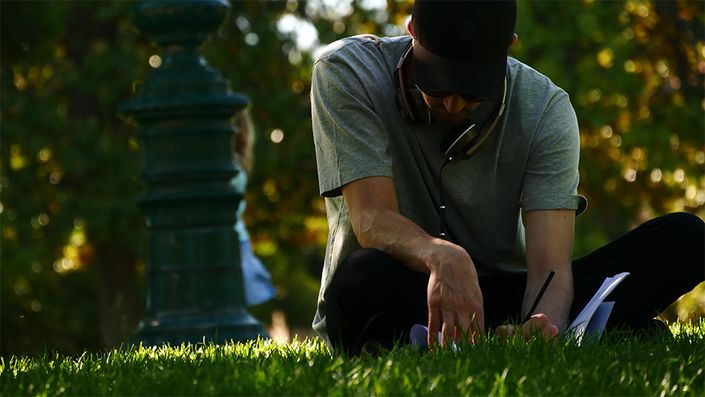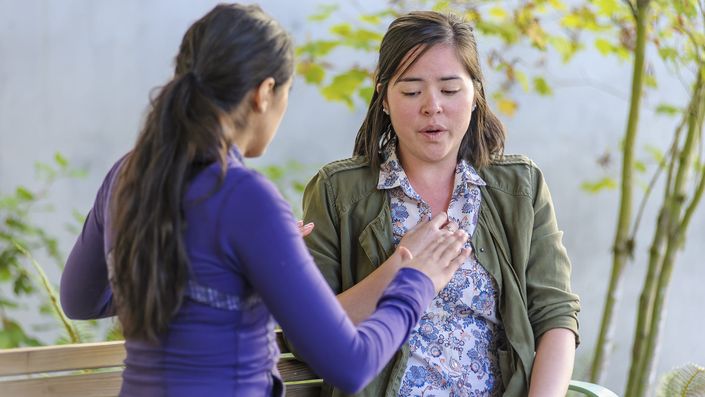The Canadian Red Cross Learning Campus is closing on January 15, 2026. Complete all courses by this date. Explore additional online courses through My Red Cross.
Building Resilience in Psychological First Aid
In a world filled with constant challenges, Psychological First Aid is your compass, guiding you to a place of strength and resilience. It all starts with caring for yourself—nurturing your thoughts, feelings, and emotions—so you can be a pillar of support for your loved ones when they face adversity.
Get training in Psychological First Aid and learn how to anticipate stress whenever possible and equip yourself with the skill set to practice self-care and to provide care for others during times of stress, crisis or trauma.
Your PFA Journey Starts with two courses: Self-Care and Caring for Others
Embark on a transformative journey with our two online trainings: Self-Care and Caring for Others. Complete both courses for a well-rounded approach to psychological first aid and wellness.
A unique approach: Unlike mental health first aid, which trains people to help someone during a mental health emergency, Red Cross Psychological First Aid teaches you how to build resiliency to stress and establish coping strategies.
In these courses you’ll learn:
• How to anticipate stress and crisis whenever possible.
• The effects of stress, loss, trauma, and grief.
• How to build and use a personal self-care plan.
• The skillset to practice self-care and to provide care for others during difficult times.
• How to access the various specialized supports that are available to anyone experiencing distress.
Get Started Now
Common questions about Psychological First Aid
What is psychological first aid?
Psychological First Aid (PFA) is a technique that helps people build resilience and cope with stress, loss, trauma, and grief to support themselves and others. It involves recognizing and addressing the experiences of those affected by crises and providing them with immediate support.
PFA is an evidence-based approach that can be applied to help individuals in the aftermath of disasters and traumatic events. It is also as a tool to help people manage everyday stress and build personal and community resilience PFA focuses on anticipating stress whenever possible and equipping oneself with the skills necessary for self-care and caring for others during times of stress, crisis, or trauma.

Why is Psychological first aid important?
First aid for the mind is just as important as first aid for the body.
Psychological First Aid (PFA) is crucial in managing the psychological impact of traumatic events, promoting resilience, and supporting individuals and communities in times of crisis. It's all about promoting resilience and support for individuals and communities when things get tough.
The goal is to ease emotional distress and prevent psychological symptoms from getting worse by giving people the tools they need to cope. If PFA is appropriately done, it can help reduce the risk of long-term mental health problems. Plus, it helps build up communities and makes it easier for people to seek mental health support without feeling like there's a stigma around it.

Is Psychological first aid the same as Mental Health First Aid?
While Mental Health First Aid focuses on educating professional responders on the signs, symptoms, and care for various types of mental health issues, Psychological First Aid offers a daily aid to dealing with the stresses of life for individuals within a broad spectrum of communities. Understanding and taking caring of yourself is also a critical part of providing psychological first aid.
PFA empowers you with targeted strategies to comfort, stabilize, and restore hope when it's needed the most. It's about swift, impactful actions that can help individuals on their healing journey. Choosing PFA is investing in the ability to make an immediate, profound difference in crisis situations as well as managing the stresses of daily life.

Who should enrol in a Psychological First Aid course?
The Psychological first aid courses are designed for a broad audience, including people who want to improve their self-care practices for better psychological well-being. First responders can benefit from these courses by developing emotional resilience during crisis situations.
Members of the workforce who need strategies to balance personal and workplace pressures can also enroll. Additionally, students and youth aged 14 and above can take the course to build emotional intelligence and develop coping mechanisms for academic and social challenges.




